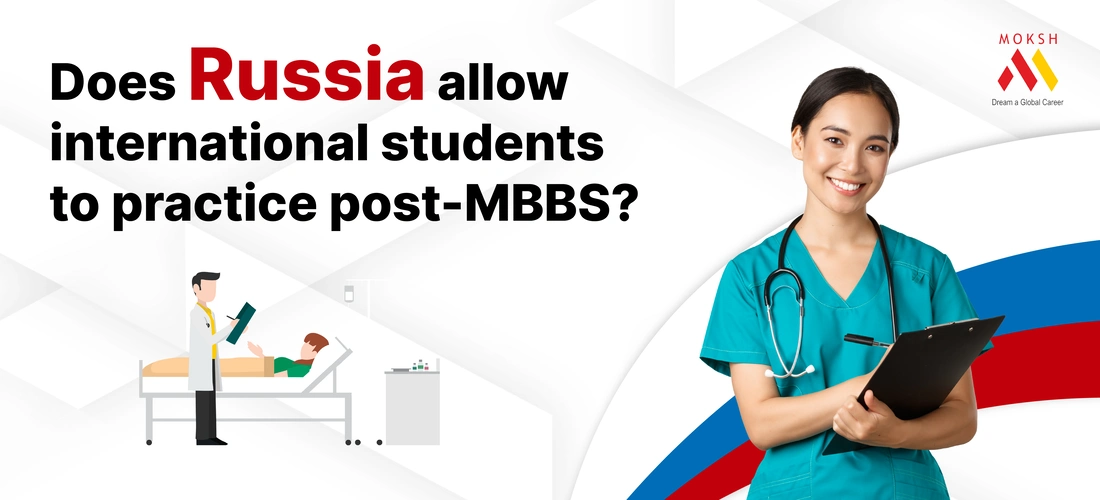
Does Russia allow international students to practice post-MBBS?
For aspiring doctors worldwide, Russia has emerged as a compelling destination to pursue an MBBS degree. The allure lies in its affordability, globally recognized degrees, and strong focus on practical training. But a crucial question remains: Can international students actually practice medicine in Russia after completing their MBBS?
The answer isn't a simple yes or no. While the opportunity exists, it requires navigating specific regulations and overcoming some challenges. This blog will guide you deep into the intricacies of practicing medicine in Russia as an international MBBS graduate.
Understanding the Russian Medical Education System
Before delving into post-MBBS practice opportunities, it's essential to understand the structure of the Russian medical education system. In Russia, medical education typically spans six years, with the curriculum focusing on foundational sciences followed by clinical rotations in affiliated hospitals.
Recognition of Russian Medical Degrees
One of the key concerns for international students is the recognition of their Russian medical degrees. Fortunately, medical degrees obtained from Russian universities are widely recognized globally. Entities such as the World Health Organization (WHO) and the Medical Council of India acknowledge Russian medical qualifications, facilitating the eligibility of graduates to practice medicine in various countries.

Eligibility to Practice Medicine in Russia
Yes, international students who graduate with an MBBS degree (awarded as an M.D. in Russia) from a recognised university are eligible to apply for a medical license in Russia. Here's what you'll need:
- Valid MBBS Degree: Your degree must be from a university accredited by the Ministry of Health of the Russian Federation.
- Passing the Qualification Exam: You'll need to pass a state medical licensing exam conducted in Russian. This exam assesses your medical knowledge and competency to practice in Russia.
- Russian Language Proficiency: Fluency in Russian is crucial for effective communication with patients and colleagues. Universities might offer preparatory courses, but achieving fluency is essential.
- Work Permit and Visa: International graduates need a work permit to be employed as a doctor in Russia. Securing a job offer from a medical institution can facilitate obtaining the necessary visa and work permit.
Opportunities for Postgraduate Studies
After completing your MBBS in Russia, international students have various opportunities for further studies and specialisation. Russian medical universities offer a various range of postgraduate programs and residency opportunities in various medical specialties. These programs provide advanced training and clinical exposure, enabling students to pursue careers as specialist doctors or researchers.
Career Prospects in Russia for International Graduates
Russia offers promising career prospects for international candidates who wish to practice medicine in the country. Upon fulfilling the necessary requirements, including obtaining a medical license from the Russian Ministry of Health, international graduates can explore opportunities in:
- Public healthcare institutions: Hospitals, clinics, and healthcare centers across Russia employ medical professionals, including international graduates, to address the healthcare needs of the people.
- Private healthcare sector: Private hospitals and medical facilities also recruit qualified doctors to provide specialized medical services to patients.
Comparison of Post-MBBS Practice Opportunities in Russia and India:
| Aspect | Russia | India |
|---|---|---|
| Licensing Requirements | Specific licensing exams required | Compulsory licensing examination (NEXT) |
| Postgraduate Opportunities | Diverse options for specialization | Competitive entrance exams for PG courses |
| Language Proficiency | English-medium instruction available | English-medium instruction |
| Residency Training | Available in various specialties | Residency programs after PG |
| Cultural Experience | Exposure to Russian culture | Exposure to diverse Indian culture |
Conclusion
In conclusion, Russia does allow international students who have completed their MBBS to practice medicine, provided they meet the necessary eligibility criteria and licensure requirements. With globally recognized medical degrees, diverse postgraduate opportunities, and promising career prospects, Russia offers a conducive environment for international graduates to pursue their medical careers. By selecting the right Study Abroad Consultancy you can understand the regulations and opportunities available for international students and can make informed decisions regarding your post-MBBS practice options in Russia.









